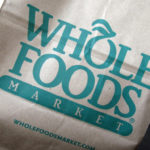
The results are in, and “more Americans than ever are choosing natural and/or organic foods,” says Whole Foods. Which is good, because that’s what Whole Foods sells.
The grocery chain has released the results of its fifth annual “Whole Foods Market Food Shopping Trend Tracker Survey.” It found that two-thirds of respondents call themselves value seekers: “someone very aware of prices, bargains, coupons and specials.” Aware of them, perhaps, but not necessarily devoted to them. Because nearly three-quarters won’t compromise on the quality of their food, even if it means paying more for it.
That’s good news for Whole Foods, which is well known for “quality” and “paying more for it”. The survey also reported the following findings:
- 47% will pay higher prices for locally produced foods
- 32% will pay more for foods with no artificial ingredients, preservatives or colorings
- 30% will pay more for meats raised with no antibiotics or added growth hormones
- 24% will pay more for meats raised under humane animal husbandry standards
With all these people willing to pay more, who needs those “value seekers” anyway? Well, Whole Foods isn’t giving up on them. “We don’t believe shoppers should have to sacrifice quality for price,” the company’s president and COO, A.C. Gallo, says. “So we aim to offer high quality food that fits every budget through competitive pricing and expanding our 365 Everyday Value line.”
If the results of the Whole Foods-sponsored survey conveniently support Whole Foods’ mission, at least their fans are more likely to be pleased with this report, than they were with a recent Stanford University study. That study concluded that, while “consumption of organic foods may reduce exposure to pesticide residues and antibiotic-resistant bacteria,” there’s no “strong evidence that organic foods are significantly more nutritious than conventional foods.” Critics said the study didn’t take unmeasurable factors like better taste into account. But researchers insisted to the New York Times there was no hard evidence to “support the superiority of organics over conventional food.”
After that report was released, Times columnist Roger Cohen slammed organic food and its devotees. “Organic has long since become an ideology, the romantic back-to-nature obsession of an upper middle class able to afford it,” he wrote, calling organic “an effective form of premium branding rather than a science, a slogan rather than better nutrition.”
If true, Whole Foods is taking that slogan to the bank. The company says its survey shows “that Americans from all demographics” are increasingly seeking out organic products. According to the Organic Trade Association, the organic meat and produce market was nearly $13 billion last year. And Whole Foods reported revenues of $10.1 billion last year.
So organic may or may not be better for you, but one thing’s for certain – it’s great for Whole Foods.










